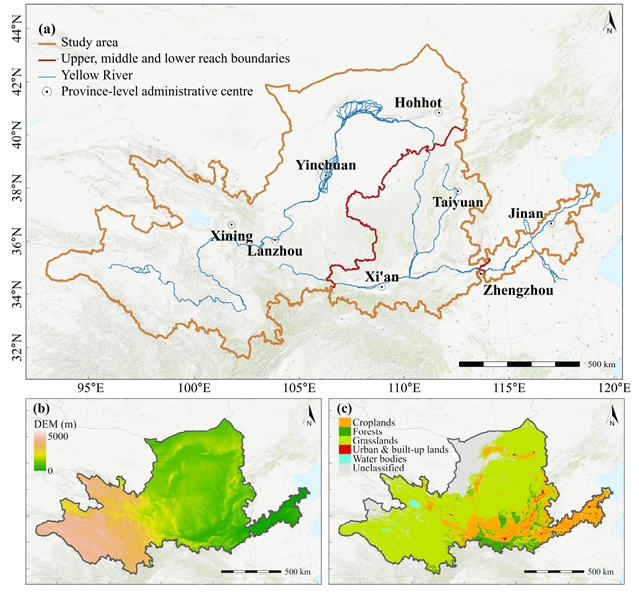
近日,河南大学刘彦随团队研究了极端高温对黄河流域植被固碳的影响。2025年10月23日,《中国科学:地球科学》杂志发表了这一成果。
黄河流域横跨中国东部、中部和西部三个地理阶梯,表现出明显的区域异质性和对极端高温条件的敏感性。
研究组采用卡耐基-艾姆斯-斯坦福方法(CASA)模型对2000-2022年流域植被净初级生产力(NPP)的时空格局进行了量化。采用动态气候计量模型评估了极端热胁迫对植被固碳的影响,量化了人为对热致NPP变化的贡献。结果表明:2000 ~ 2022年,极端高温显著抑制了黄河流域植被固碳。极端高温每增加一天,NPP降低约0.21%,这种抑制作用持续到第二年。极端高温的边际效应表现出显著的异质性,受年平均温度和温度变率的调节。具体而言,在年平均气温升高和温度变异性增强的地区,观察到更明显的NPP抑制。
此外,极端高温日数的人为贡献逐渐增加,空间影响不断扩大。因此,人为极端高温导致的碳固存损失在2008年后加速,在2020年达到1.49×1013 g C(约为年度削减的7.05%)。这些发现为优化黄河流域生态策略和全球气候变化政策提供了重要依据。
附:英文原文
Title: Effects of extreme heat on vegetation carbon sequestration <sc>in the Yellow River Basin</sc>
Author: Guanpeng DONG, Yuchen GUO, Hongjuan ZHANG, Yansui LIU, Yurui LI, Han ZHANG, Junting ZHONG
Issue&Volume: 2025/10/23
Abstract: The Yellow River Basin spans three geographical steps across eastern, central, and western China and exhibits pronounced regional heterogeneity and sensitivity to extreme heat conditions. This study employed the Carnegie-Ames-Stanford Approach (CASA) model to quantify the spatiotemporal patterns of vegetation net primary productivity (NPP) in the basin (2000–2022). A dynamic climate econometric model was employed to evaluate the impact of extreme heat stress on vegetation carbon sequestration and quantify the anthropogenic contributions to heat-induced NPP changes. The results indicated that extreme heat significantly suppressed vegetation carbon sequestration in the Yellow River Basin from 2000 to 2022. Each additional day of extreme heat reduced the NPP by approximately 0.21%, with this inhibitory effect persisting into the following year. The marginal effects of extreme heat exhibited significant heterogeneity, modulated by both the mean annual temperature and temperature variability. Specifically, more pronounced NPP suppression was observed in regions characterized by elevated mean annual temperatures and enhanced temperature variability. Furthermore, the anthropogenic contributions to extreme heat days progressively increased, with a continuously expanding spatial influence. Consequently, anthropogenic extreme heat-induced carbon sequestration losses accelerated after 2008, reaching 1.49×1013gC in 2020 (~7.05% of annual sequestration). These findings provide critical evidence for optimizing ecological strategies in the Yellow River Basin and inform global climate change policies.
DOI: 10.1007/s11430-024-1712-8
Source: https://www.sciengine.com/SCES/doi/10.1007/s11430-024-1712-8
Science China Earth Sciences:《中国科学:地球科学》,创刊于1952年。隶属于施普林格·自然出版集团,最新IF:5.7
官方网址:https://www.sciengine.com/SCES/home
投稿链接:https://mc03.manuscriptcentral.com/sces
